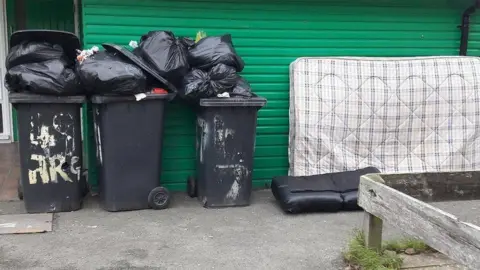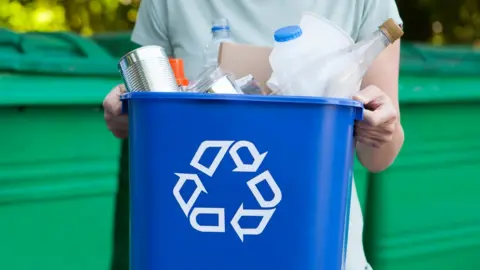Rubbish idea? Monthly bin collections in Welsh county
Controversial monthly bin collections are being rolled out across a Welsh county on Monday - the first area in Wales and England to make the move.
Waste destined for landfill will now only be collected once a month in Conwy county following a trial.
It has been met with controversy, with residents and councillors calling it "unfair" and claiming the trial brought more rats, seagulls and flies.
The council said it could save £390,000 a year and concerns had been addressed.
It said food waste was collected weekly and it offered a free weekly collection service for nappies and incontinence products - to reduce the smell in residual waste bags.
Many parts of the UK are now moving towards bin collections every three weeks in a bid to cut down on residual waste and increase recycling.
Two councils in Scotland have made the move to bin collections every four weeks - Fife and Falkirk - and Belfast City Council has included the option as part of a consultation into the future of its waste and recycling.
From the outset, the year-long monthly bin collection trial in Conwy county - brought in for 11,000 homes in in 2016 - caused a stink.
Many residents are still unhappy about the changes, and have said the rubbish causes a smell, breeds maggots and attracts mice and rats.
 Bill Darwin
Bill DarwinSome have also admitted to burning their waste in a bid to reduce the amount of rubbish in their bins.
"It's the length of time that's the problem, not the quantity," one resident said.
"It festers. It's as simple as that. The whole area is plagued with flies now in the summer.
"We've bought an incinerator so we burn the majority of the rubbish, which is not good for the environment.
"But we have animals and they refused to pick up animal waste, so it has to go in black bag. It sits there for a month then."
Families in particular have reported having issues with bins that are too full.
"I think it's dreadful. They should be emptied regularly," another resident said.
"It's more than full after two weeks and I burn some of it. You're not supposed to do that, but you have to otherwise the bin is absolutely bursting.
"It is more manageable at three weeks, but I think four weeks is a step too far, especially for families."

How can you reduce your waste?
 Getty Images
Getty Images- The best tip to reduce waste is not to produce it in the first place. Plan what you buy and buy what you plan
- Get to grips with what your local council recycles - not all recycle the same things
- Is junk mail a problem for you? De-register yourself from online marketing lists. If you do get junk mail through the door remember to recycle it
- Think before you throw away an unwanted electrical item. Ask if your friend or family if they want it, sell it or donate to charity
- Buy a compost bin and make your own compost to enrich your garden and reduce the amount of garden and kitchen waste your throw away
- Source: Recycle for Wales

The decision to roll out the four-weekly collections was signed off by the cabinet in January, despite councillors voting to scrap the scheme in November 2017 in favour of three-weekly collections.
It came despite councillors expressing concern that the county was "not ready" for the new system and that more people would struggle with overflowing bins.
In response, the cabinet put extra measures in place to help residents recycle, including free collection of large items, free nappy bins for grandparents who look after children and bespoke collections for people who miss having bin collections if they are on holiday.
Reports by council officials had previously suggested that four-weekly collections would increase the amount of rubbish that was recycled and also save the council up to £390,000 per year.
The drive for more recycling is being made across the country, with authorities facing fines if they fail to meet targets.
Last year it was announced that a target for 64% of waste to be recycled in Wales by 2019-20 had been met four years early.
On its website, Conwy council said: "We currently recycle 64% of our waste, which is really good, but we need to recycle 70% by 2024/25 to meet the Welsh Government's targets. If these targets are not achieved the council may be fined.
"A year long trial of four weekly collections to 10,000 households has led to 14% increase in recycling and 31% decrease in the amount of refuse in the wheelie bins. These items are now being recycled into something new and the food waste is being used to make electricity. As a result of the trial, we are now rolling this out county-wide from September 2018."
